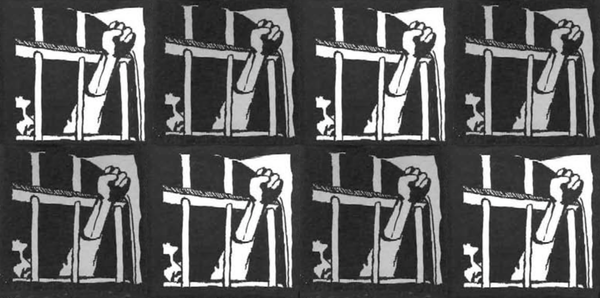In Search of Resilience

In December I wrote about trying to cultivate inner peace and forgive the world for being the way it is. Two months into Trump’s presidency and I have to say, it’s not exactly going well. While I’m generally emotionally stable, I’m still suffering dark nights of the soul. Sometimes I become so certain of hopelessness that I simply wish I had never been born. I don’t forgive the world for being like this. I hate it.
I expect I’ll be feeling this a lot over the next four years, if not for the rest of my life. Recently I spent a half hour venting to my wife Debbie about how I think humans should stop procreating because we’re irreparably “fucked.” It was not a nice experience for her. I had a lot of time to myself before that conversation, time I spent mulling over my world-weariness and calmly spiraling into nihilism. I thought horrible, evil thoughts. Thoughts of violence and misanthropy and extremism.
I take medication, but I believe the only cure for these thoughts is justice. There is within my heart an emptiness which can only be satisfied by liberation. It’s a sickness I share with people all over the world. And I do “wish it on my worst enemy,” as they say. I wish it on all people. I would have everyone infected by it. We should all be restless for freedom, burdened with an insatiable rage at the powers that be. Ease, I say, is the real sickness, complacency the real infirmity. For who can be at peace when billions of people are dragging out their lives in misery? It is only when enough of us feel horrible enough about the status quo that we will rise up and use our power to change it.
“Some people sit down to a meal and bring nothing along, not even a good appetite—and then they blaspheme: ‘All is vanity!’
But to eat and drink well, O my brothers, is truly no vain art! I tell you to shatter, shatter the tablets of the permanent malcontents!”1
- Friedrich Nietzsche
Here I am quoting Nietzsche again. Some day I’ll write a real refutation of his philosophy, but for now he’s still a good conversation partner. He just has no patience for world-weary socialists like me, who can never be happy with things as they are. For Nietzsche, the highest form of philosophy is radical life-affirmation, embracing everything good and bad in an ecstatic chorus of Yes. And I find that idea challenging, an invitation to transcend my discontentment and celebrate the world. Wouldn’t it be lovely to overcome my despair with an even deeper joy?
“Joy is resistance.” “Rest is resistance.” I know these things can be true, but I don’t know them to be true at my core. I don’t know how they’re true. I don’t know how to live them. I’m not particularly well-versed in celebrating life. I’m one of Nieztsche’s “world-slanderers,” who say, “The world is a shitty monster.”2 I wallow and complain and wrestle.
I’m disappointed. And I know that there’s something typically white about my disappointment, something coming out of a privileged existence. Maybe there is some formative experience from when I was young that informs this disappointment, an experience of not getting what I want which I have yet to get over. But it is typically white to be upset that the world does not operate the way I think it should, to feel that I deserve to live in a world according to my desires. And it is not uncommon for white people to feel deep despair in response to reality. White Americans have been found to be the most likely group to die “deaths of despair,” meaning deaths related to alcohol, drug abuse, or suicide.3 Even so, white people are less likely than people of color to experience poverty, unemployment, homelessness, illness, police brutality, or incarceration. We are less oppressed and have fewer reasons to despair, and yet we are more likely to die of despair.
Maybe that emptiness within me is not a solidarity with the oppressed, but a nostalgia for power. And maybe my disappointment has more to do with a lack of status than a lack of justice. I’d hate for that to be the case, but I’m only human.
Only human. Something humans say when we confront our basic weakness: we cannot control our circumstances. Learning resilience will mean coming to terms with this fact. It will mean learning to accept my weakness and living with it.
For Nietzsche, strength is not found in forcing things to be the way we want them to be, but in turning every “it was” into “I wanted it thus.”4 Strength is the ability to reconcile with our weakness.
“I am content with weaknesses, insults, hardships, persecutions, and calamities,” the apostle Paul wrote, for God’s power “is made perfect in weakness” and, “when I am weak, then I am strong” (2 Cor. 12). He was an apostle of Christianity, the central symbol of which is an innocent man dying on a cross. For Jesus, the source of resilience is not political power, nor is it dependent on success. No king gives it to you. No king takes it from you. It comes, rather, from the kingdom of God within.
Jack Holloway
Footnotes:
1 Friedrich Nietzsche, Thus Spoke Zarathustra, ed. and trans. Stanley Applebaum (Mineola: Dover, 2004), 155.
2 Nietzsche, 155, 157.
3 Giuliana Grossi, “High Rates of ‘Deaths of Despair’ Observed Among White Americans,” The American Journal of Managed Care (Feb. 7, 2024), https://www.ajmc.com/view/high-rates-of-deaths-of-despair-observed-among-white-americans#.
4 Nietzsche, 101.



